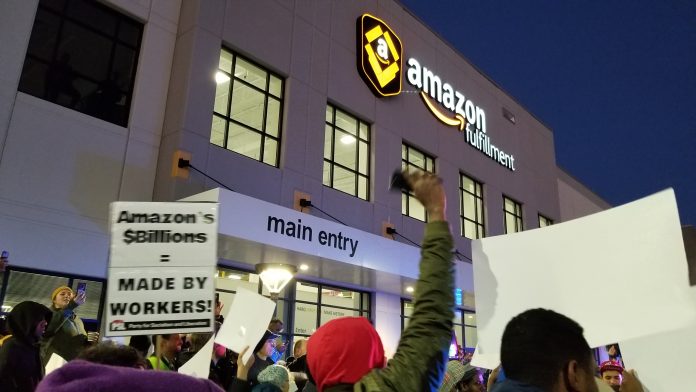A largely-immigrant population walks off the job at Amazon—utilizing rights many Americans do not know: Workers have the right to engage in “concerted activity” without a union.
 SHAKOPEE, MN—Amazon workers in an Amazon fulfillment center in Shakopee, Minnesota walked off the job on March 7th in protest of the company increasing their workloads.
SHAKOPEE, MN—Amazon workers in an Amazon fulfillment center in Shakopee, Minnesota walked off the job on March 7th in protest of the company increasing their workloads.
Many of the workers, who are not unionized, are East African immigrants and practicing Muslims, according to LaborNotes.org.
Workers in the stow department came to work that night to find that their rate had been raised again. “When they told us about the changes and the increasing, increasing, increasing workload,” said [Mohamed Hassan, one of the strikers], “we decided to fight back.”
About half of the 60 stowers on the night shift walked out of the facility together. They timed the action for immediately after their lunch break, around midnight, when their action would have the most impact on the operations of the entire warehouse.
The workers met down the street at a Perkins restaurant, where they wrote up and voted on their list of demands. In addition to calling for an “end [to] the unfair rates that force errors and end careers,” they called on Amazon to stop the use of temporary employees, to “stop counting prayer and bathroom breaks against rate,” and to better maintain the equipment that most often leads to injury.
Three hours later, the strikers returned to the facility and attempted to deliver their demands to Amazon managers.
Supervisors refused to meet with the workers as a group, but agreed to meet with a representative the next day. According to the strike’s organizers, nothing concrete came out of that meeting.
This is the second time the Amazon workers went out on strike–the first time being last December.
Although the workers have been working with a so-called “worker center,” they are not considered unionized.
However, Section Seven of the National Labor Relations Act allow non-union employees like those employed at Amazon to engage in “concerted activity” without fear of reprisal.
In fact, according to the National Labor Relations Board (NLRB) website:
The law we enforce gives employees the right to act together to try to improve their pay and working conditions, with or without a union. If employees are fired, suspended, or otherwise penalized for taking part in protected group activity, the National Labor Relations Board will fight to restore what was unlawfully taken away. These rights were written into the original 1935 National Labor Relations Act and have been upheld in numerous decisions by appellate courts and by the U.S. Supreme Court… [Emphasis added]
While concerted activity includes the right to strike, the catch to it, of course, is that strikers can be replaced—unionized or not unionized.
What’s more, if the strikers are “economic strikers,” although they cannot be fired, they can be replaced permanently.





